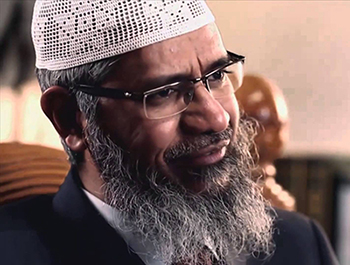Mumbai, Jul 7: Rubbishing the fresh allegations made by a section of media against him that he inspired the terrorists in Bangaladesh, who killed 22 people in Dhaka recently, Islamic Research Foundation chief Dr Zakir Naik has made it clear that he never encouraged violence or terrorism.
“I totally disagree (with suggestion) that I inspired this act of killing innocent people. There is not a single talk of mine where I encouraged anyone to kill another person - Muslim or non-Muslim,” said the internationally acclaimed orator.
The 50-year-old former medical practitioner and an authority on comparative religion, who was reportedly in Makkah when a section of media launched a hate campaign against him, belatedly came to know about the fresh allegations, sources said.
In videos made available through his office in Mumbai, where the police has now stationed constables, Dr Naik says he is "not shocked" that the Dhaka terrorists had cited him on social media in recent posts.
"More than 90 per cent Bangladeshis know me...," he says in English, stressing, "Every fan of mine may not follow everything I say." In the WhatsApp-ed video, he says, "I disagree that I inspired this act of killing innocent people".
Mumbai Police to probe
Meanwhile, Maharashtra government has asked Mumbai Police to conduct a probe into Dr Zakir Naik's speeches.
"I have asked the Mumbai Police Commissioner to conduct a probe (into Naik's speeches) and submit a report," Chief Minister Devendra Fadnavis told media persons today.
Everything, including Dr Naik's speeches, his social media accounts, sources of funding (of a foundation run by him in Mumbai) will be scrutinised, said Fadnavis, who also holds the Home portfolio.
The direction comes amid allegations by a section of media that one of the terrorists who attacked an upmarket restaurant in the Bangladeshi capital a few days ago, killing 22 people, was inspired by sermons Dr Naik.
Also Read:
Dr Zakir Naik's speeches are highly objectionable, action will be taken: Govt
Police deployed at Mumbai office of Dr Zakir Naik as precautionary measure
Examine sermons of Dr Zakir Naik: Bangladesh tells India
Will Modi govt take action against Dr Zakir Naik without verifying facts?





Comments
Prem, you are making a mockery of urself here.. your comments above simply shows ur stupidity and hatred.... Dr Zakir naik would love to debate any scholar of any religion of highest caliber. He knows the whole bible word by word more than any christain scholars do.. plz watch the debate between william campbell and Dr Zakir naik and i am sure that u will change ur opinion about a great scholar Dr Zakir Naik and in shaa Allah you will be also inspired by him to spread peace to others.
#5 Suresh, udupi — 2016-07-08
Why he is not debating with Jerry Thomas.
Because zakir naik is scared.
Zakir Naik will not be spared if he is debating with the right persons.
That is the reason he runs away. Many religious people know that zakir naik is one screw loose.
Dear Prasad,
Why you want others help to debate with zakir naik? It looks you have very good knowledge about religion. So why cant you debate? If you cant shut and keep quite. Don't call others to rescue you.
Prem Prasad,
Do any relgious indian scholor have gut to debate with Zakir? Ravi shanker him self lost last time.
@#3 sana, UAE — 2016-07-08
Shabbir Ali whispered you in your ears and minds sam shamoun lost the debate.
I did not ask Shabbir Ali to debate with Sam Shamoun.
I asked Joker Naik to debate with Sam Shamoun Dr. David Wood, Brot
Dear Prem Prasad
the christian orators you mentioned especially sam shamoun like people have been in debate with canada based muslim orator shabbir ally and have lost the debate.
pls do check shabbir ally
If Zakir Naik has guts let him debate with Christians Sam Shamoun, Dr. David Wood, Brother Tony Costa, Pastor Joseph and Brother Jerry Thomas. He escapes debating with them as they are demanding him to debate with them. Muslims should watch several you tubes of
David Wood, Sam Shamoun, Dr. James White, Brother jerry Thomas and Brother Tony Costa. You will know the real truth about Islam.
If terrorist really inspired by Zakir. He would have given daawah to non-muslims instead of killing.
People have lost the faith on Indian Politics. Recently Zakir Bhai challenged non-muslim scholar, so the result they attacked zakir through terrorism. Because they know falsehood will be perished against True man zakir. There is no scholar in the world to debate with zakir.
Add new comment